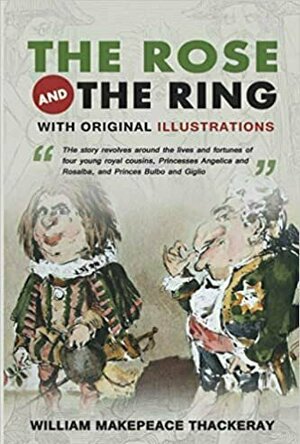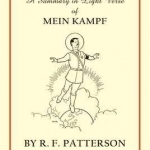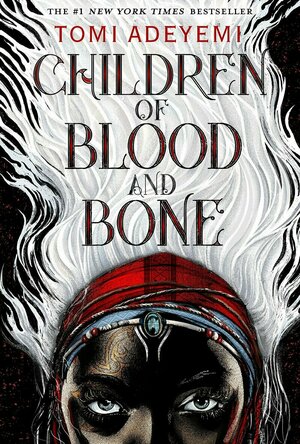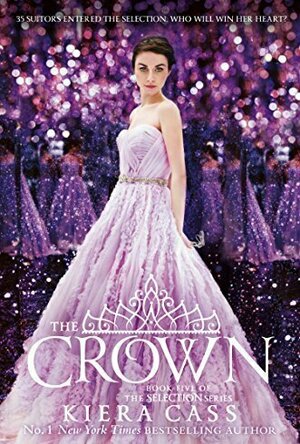Search

The Rose and the Ring
Book
The plot opens on the royal family of Paflagonia eating breakfast together: King Valoroso, his wife,...
Sophia (Bookwyrming Thoughts) (530 KP) rated Inherit the Stars (Inherit the Stars #1) in Books
Jan 23, 2020
<b><i>I received this book for free from Publisher in exchange for an honest review. This does not affect my opinion of the book or the content of my review.</i></b>
Elwoods debut novel focuses on three royal kingdoms (known as Houses) set in space: Fane, Galton, and Westlet. As the youngest daughter of Fane, Asa hopes to solve her familys (and the Houses) problems and save her oldest sister from death by posing as her sister in a marriage to the heir of Westlet.
Much as the romance is completely unrealistic, at least I have a fondness for <i>Inherit the Stars</i>. The heir of Westlet has scars. Legit scars. Half of his face scarred. And that resonates with me because of all the love interests Ive read (and thats a lot)?
None of them had scars. <em>None</em>, much less half their face. (Okay, occasionally theres a scar or two, but none of them are major enough to send most girls running away to side two of a love triangle, if any exists.) I think my only major problem with this ship is dear Eagle and Asa avoid each other like they have the plague. Being sociably close means theyll make their plagues worse than it is. One minute theyre avoiding each other, the next they accidentally get close, and the next? I love you is thrown.
Not to be overly blunt and crude, but tell me they wont get <em>extremely</em> close (like really, really close) in the next minute. Now if the ILYs mean, I think I love you, but I have to know you better before I finalize that, then maybe Im okay. <em>Maybe</em>.
But Eagle has SCARS. I'm okay with this. VERY okay.
<em>Anyways</em>, awkwardness aside, <i>Inherit the Stars</i> reminds me of Victoria Aveyards <i>Red Queen</i>, especially when it comes to Lady Westlet. Shes a little cold, indifferent, and cares about power, but shes a warm character who cares just a little about Asa as well as the good of her House. Lady Westlet isnt black and white she has a gray area about her that I really like.
For the most part, Elwood focuses a good part of the book on the political intrigue between the three Houses and the romance between Asa and Eagle. But while Im not a fan of politics or books with heavy romance, I may stick around for the sequel.
<a href="https://bookwyrmingthoughts.com/arc-review-inherit-the-stars-by-tessa-elwood/"; target="_blank">This review was originally posted on Bookwyrming Thoughts</a>
Elwoods debut novel focuses on three royal kingdoms (known as Houses) set in space: Fane, Galton, and Westlet. As the youngest daughter of Fane, Asa hopes to solve her familys (and the Houses) problems and save her oldest sister from death by posing as her sister in a marriage to the heir of Westlet.
Much as the romance is completely unrealistic, at least I have a fondness for <i>Inherit the Stars</i>. The heir of Westlet has scars. Legit scars. Half of his face scarred. And that resonates with me because of all the love interests Ive read (and thats a lot)?
None of them had scars. <em>None</em>, much less half their face. (Okay, occasionally theres a scar or two, but none of them are major enough to send most girls running away to side two of a love triangle, if any exists.) I think my only major problem with this ship is dear Eagle and Asa avoid each other like they have the plague. Being sociably close means theyll make their plagues worse than it is. One minute theyre avoiding each other, the next they accidentally get close, and the next? I love you is thrown.
Not to be overly blunt and crude, but tell me they wont get <em>extremely</em> close (like really, really close) in the next minute. Now if the ILYs mean, I think I love you, but I have to know you better before I finalize that, then maybe Im okay. <em>Maybe</em>.
But Eagle has SCARS. I'm okay with this. VERY okay.
<em>Anyways</em>, awkwardness aside, <i>Inherit the Stars</i> reminds me of Victoria Aveyards <i>Red Queen</i>, especially when it comes to Lady Westlet. Shes a little cold, indifferent, and cares about power, but shes a warm character who cares just a little about Asa as well as the good of her House. Lady Westlet isnt black and white she has a gray area about her that I really like.
For the most part, Elwood focuses a good part of the book on the political intrigue between the three Houses and the romance between Asa and Eagle. But while Im not a fan of politics or books with heavy romance, I may stick around for the sequel.
<a href="https://bookwyrmingthoughts.com/arc-review-inherit-the-stars-by-tessa-elwood/"; target="_blank">This review was originally posted on Bookwyrming Thoughts</a>

Mein Rant - A Summary in Light Verse of 'Mein Kampf'
R.F. Patterson and Heath Robinson
Book
R F Paterson was a great fan of Gilbert and Sullivan, and when Germany invaded Poland on 1st...
Sophia (Bookwyrming Thoughts) (530 KP) rated A Wicked Thing (A Wicked Thing, #1) in Books
Jan 23, 2020
<b><i>I received this book for free from Publisher in exchange for an honest review. This does not affect my opinion of the book or the content of my review.</i></b>
My all-time favorite Disney movie (in VCR) – along with Pocahontas and Mulan, to which there are literally zilch retellings to my knowledge – while growing up was <i>Sleeping Beauty</i>. I even reenacted it... for fun and on my own (expected of a four or five year old).
And perhaps it is also one of the most difficult tales to be retold. There's a princess who has a curse placed on her that she would prick her finger on the spindle of a spinning wheel before her sixteenth birthday and die – not entirely too much to take a spin on, is there?
No pun intended.
Much as I give props to Rhiannon Thomas for taking <i>Sleeping Beauty</i> on another path, <i>A Wicked Thing</i> is certainly not a book I would enjoy even for the pleasure of reading. In fact, truth be told in maybe a harsh way, <i>A Wicked Thing</i> was funny. And while funny typically means a good thing, I honestly had a field day reading the first three chapters in between chess matches and poking fun at the book (aka making sassy comments that will make no appearance whatsoever in this review aside from a big basket of mozzarella sticks).
<i>A Wicked Thing</i> is almost a sequel to the original <i>Sleeping Beauty</i>. Some time has passed, and then the prince kisses Aurora – all that jazz is pretty much the same aside from maybe happily ever after, to which I won't bother finding out. Perhaps there <i>is</i> a happily ever after by the end of the book – I'm still not going to go and find out because I'm too focused on making it to at least the top 10 in the class now that I'm extremely close to it.
But let's start with the prince kisses Aurora. She wakes up and screams. It probably makes sense to scream when you wake up to a random stranger hovering above your face and actually kissed you. Honestly, a pretty fantastic opening scene – and I'm serious – aside from the part where the "boy" (we don't know he's a prince YET) says, "I did it. I actually did it."
Then I get a sled and start laughing gleefully (read: found it absolutely amusing) while sliding down a hill (read: continuing the book just see how it all plays out because I haven't found reasons to throw this aside yet and then I do).
Prince Rodric, the "boy," is pathetic. The <i>royal family</i>, in my opinion, is a little pathetic and cheesy. Are they actually pathetic? Perhaps not when you really get to know them and perhaps they're marvelous rulers and the people love them oh-so-dearly, but from the little bit of the book that I read and met the royal family, I find myself disappointed. Particularly disappointed in Rodric the princeling because he will obviously make a huge appearance throughout the rest of the book and I've got to at least like the main characters to enjoy the book.
The dear prince blushes <i>at almost every single sentence he speaks to Aurora</i>. I'm pretty sure the amount of blushes will be the equal amount of election commercials soon (Vote for me! Vote for me!).
<blockquote>He stopped and blushed again.</blockquote>
Princeling probably stutters as well, and is most likely a descendant of Romeo.
<blockquote>“I mean, you always look beautiful. But you look especially beautiful tonight. Is what I mean.”</blockquote>
The king is overly cheery, and while there seems to be a probable reason (my son woke up a slumbering princess!), "overly cheery" really means "exuberantly happy-go-lucky."
<blockquote>“Please send out the heralds. A little extra pomp and circumstance, if you please. It is hardly a normal day.”</blockquote>
No... definitely not a normal day. That much I'll agreee with. But isn't celebrating as soon as Aurora wakes up a little overboard? The chick just woke up from a hundred plus years of slumber and everything literally comes crashing down over on her head upside down! I'm not sure Aurora appreciated that – she was quite confuzzled when she woke up (whoa... what's going on here?!) and even protested a little (not that anyone heard her).
Betsy the maid babbles in excitement and is worse than the king.
<blockquote>“I was so honored, Princess, when they asked me to assist you. I never expected it! But then, I never expected you’d be standing here, if you don’t mind me saying. Not that I didn’t think Rodric could be your true love, because of course he’s wonderful, but it always seemed too much like a dream to ever happen while I was here. Things will be amazing, now, you’ll see. Everyone loves you already. How could they not?”</blockquote>
Reasonable babbling of excitement, seeing as she's a humble servant.
But she and everyone else aside from Aurora is also a little naïve with the assumption that everything is going to be fantastic and happily ever after Aurora and Rodric marry, simply based a fairy tale.
Aurora, however, might have been a character that I would actually like had I continued the book. But by that point in the novel, when Rodric and Aurora are first dining together, I was quite cheesed (it was the constant blushing and cheeriness). While I normally feel guilty for throwing a book aside really early, I don't think I feel too guilty in <i>A Wicked Thing's</i> case.
<a href="https://bookwyrmingthoughts.com/dnf-arc-review-wicked-thing-by-rhiannon-thomas/"; target="_blank">This review was originally posted on Bookwyrming Thoughts</a>
My all-time favorite Disney movie (in VCR) – along with Pocahontas and Mulan, to which there are literally zilch retellings to my knowledge – while growing up was <i>Sleeping Beauty</i>. I even reenacted it... for fun and on my own (expected of a four or five year old).
And perhaps it is also one of the most difficult tales to be retold. There's a princess who has a curse placed on her that she would prick her finger on the spindle of a spinning wheel before her sixteenth birthday and die – not entirely too much to take a spin on, is there?
No pun intended.
Much as I give props to Rhiannon Thomas for taking <i>Sleeping Beauty</i> on another path, <i>A Wicked Thing</i> is certainly not a book I would enjoy even for the pleasure of reading. In fact, truth be told in maybe a harsh way, <i>A Wicked Thing</i> was funny. And while funny typically means a good thing, I honestly had a field day reading the first three chapters in between chess matches and poking fun at the book (aka making sassy comments that will make no appearance whatsoever in this review aside from a big basket of mozzarella sticks).
<i>A Wicked Thing</i> is almost a sequel to the original <i>Sleeping Beauty</i>. Some time has passed, and then the prince kisses Aurora – all that jazz is pretty much the same aside from maybe happily ever after, to which I won't bother finding out. Perhaps there <i>is</i> a happily ever after by the end of the book – I'm still not going to go and find out because I'm too focused on making it to at least the top 10 in the class now that I'm extremely close to it.
But let's start with the prince kisses Aurora. She wakes up and screams. It probably makes sense to scream when you wake up to a random stranger hovering above your face and actually kissed you. Honestly, a pretty fantastic opening scene – and I'm serious – aside from the part where the "boy" (we don't know he's a prince YET) says, "I did it. I actually did it."
Then I get a sled and start laughing gleefully (read: found it absolutely amusing) while sliding down a hill (read: continuing the book just see how it all plays out because I haven't found reasons to throw this aside yet and then I do).
Prince Rodric, the "boy," is pathetic. The <i>royal family</i>, in my opinion, is a little pathetic and cheesy. Are they actually pathetic? Perhaps not when you really get to know them and perhaps they're marvelous rulers and the people love them oh-so-dearly, but from the little bit of the book that I read and met the royal family, I find myself disappointed. Particularly disappointed in Rodric the princeling because he will obviously make a huge appearance throughout the rest of the book and I've got to at least like the main characters to enjoy the book.
The dear prince blushes <i>at almost every single sentence he speaks to Aurora</i>. I'm pretty sure the amount of blushes will be the equal amount of election commercials soon (Vote for me! Vote for me!).
<blockquote>He stopped and blushed again.</blockquote>
Princeling probably stutters as well, and is most likely a descendant of Romeo.
<blockquote>“I mean, you always look beautiful. But you look especially beautiful tonight. Is what I mean.”</blockquote>
The king is overly cheery, and while there seems to be a probable reason (my son woke up a slumbering princess!), "overly cheery" really means "exuberantly happy-go-lucky."
<blockquote>“Please send out the heralds. A little extra pomp and circumstance, if you please. It is hardly a normal day.”</blockquote>
No... definitely not a normal day. That much I'll agreee with. But isn't celebrating as soon as Aurora wakes up a little overboard? The chick just woke up from a hundred plus years of slumber and everything literally comes crashing down over on her head upside down! I'm not sure Aurora appreciated that – she was quite confuzzled when she woke up (whoa... what's going on here?!) and even protested a little (not that anyone heard her).
Betsy the maid babbles in excitement and is worse than the king.
<blockquote>“I was so honored, Princess, when they asked me to assist you. I never expected it! But then, I never expected you’d be standing here, if you don’t mind me saying. Not that I didn’t think Rodric could be your true love, because of course he’s wonderful, but it always seemed too much like a dream to ever happen while I was here. Things will be amazing, now, you’ll see. Everyone loves you already. How could they not?”</blockquote>
Reasonable babbling of excitement, seeing as she's a humble servant.
But she and everyone else aside from Aurora is also a little naïve with the assumption that everything is going to be fantastic and happily ever after Aurora and Rodric marry, simply based a fairy tale.
Aurora, however, might have been a character that I would actually like had I continued the book. But by that point in the novel, when Rodric and Aurora are first dining together, I was quite cheesed (it was the constant blushing and cheeriness). While I normally feel guilty for throwing a book aside really early, I don't think I feel too guilty in <i>A Wicked Thing's</i> case.
<a href="https://bookwyrmingthoughts.com/dnf-arc-review-wicked-thing-by-rhiannon-thomas/"; target="_blank">This review was originally posted on Bookwyrming Thoughts</a>
Pirates and Swearing
I received this book for free through Goodreads First Reads.
Citadel is a personal account of one man’s war against the pirates of Somalia. Jordan Wylie grew up in Blackpool and joined the King’s Royal Hussars as soon as he left school. Unfortunately, a back injury restricted the tasks he was able to perform meaning he had to leave the army behind him. However, his skills as a non-commissioned officer came in handy in his new position in maritime security. Jordan became a security guard for merchant ships that had to make the dangerous journey through Pirate Alley, i.e. Somalia. In this book, Jordan tries to encapsulate his experience aboard these ships and his encounter with the licentious pirates.
Somali pirates are not the typical figures from pantomimes, dressed in tricorn hats and frock coats, complete with pet parrot on the shoulder yelling “Avast me hearties!” Instead, they are young African men of a bellicose nature, some barely out of their teens, wielding guns with the intention of taking over ships and demanding extortionate ransoms.
Jordan was rather fortunate with his brush with pirates and never experienced being captured or attacked. Nevertheless, the occasions when Somalis attempted to take over were extremely nerve-racking, especially because Jordan and the crew had horror stories of other ships’ fates fresh in their minds. In these instances, Jordan had to remain calm and professional, relying on his army background and personal bravery to keep everyone safe.
The title, Citadel, refers to the name of the safe room the crew were required to lock themselves in should pirate attack become imminent. In some instances, entire ship crews would be locked in these rooms for days or longer, desperately awaiting rescue. Jordan’s brief exposure to the citadel was enough for him to realise how truly awful being locked below decks for a lengthy period of time would be.
Citadel lacks synchronicity and often jumps from Jordan’s own experiences to stories he has heard of other ships. He also talks about his family back home in England, including his wife and young daughter. Being away from home for months at a time is very difficult but the pay cheque of a maritime security guard is too appealing to turn down.
Unfortunately, Jordan’s narrative is ruined through his use of unnecessary expletives. Ironically, Jordan writes about telling off other security guards for swearing because it upsets the native sailors, yet, he does not think about the readers he may be irritating.
Overall, Jordan’s book Citadel brings to attention the dangers sailors face whilst shipping our everyday commodities. Most of us are unaware of the events occurring in the Middle East and the state of the lives of Somali families that force children to grow up to become pirates. Citadel is eye-opening in more ways than one and will interest readers with interest in the armed forces, security management and so forth.
Citadel is a personal account of one man’s war against the pirates of Somalia. Jordan Wylie grew up in Blackpool and joined the King’s Royal Hussars as soon as he left school. Unfortunately, a back injury restricted the tasks he was able to perform meaning he had to leave the army behind him. However, his skills as a non-commissioned officer came in handy in his new position in maritime security. Jordan became a security guard for merchant ships that had to make the dangerous journey through Pirate Alley, i.e. Somalia. In this book, Jordan tries to encapsulate his experience aboard these ships and his encounter with the licentious pirates.
Somali pirates are not the typical figures from pantomimes, dressed in tricorn hats and frock coats, complete with pet parrot on the shoulder yelling “Avast me hearties!” Instead, they are young African men of a bellicose nature, some barely out of their teens, wielding guns with the intention of taking over ships and demanding extortionate ransoms.
Jordan was rather fortunate with his brush with pirates and never experienced being captured or attacked. Nevertheless, the occasions when Somalis attempted to take over were extremely nerve-racking, especially because Jordan and the crew had horror stories of other ships’ fates fresh in their minds. In these instances, Jordan had to remain calm and professional, relying on his army background and personal bravery to keep everyone safe.
The title, Citadel, refers to the name of the safe room the crew were required to lock themselves in should pirate attack become imminent. In some instances, entire ship crews would be locked in these rooms for days or longer, desperately awaiting rescue. Jordan’s brief exposure to the citadel was enough for him to realise how truly awful being locked below decks for a lengthy period of time would be.
Citadel lacks synchronicity and often jumps from Jordan’s own experiences to stories he has heard of other ships. He also talks about his family back home in England, including his wife and young daughter. Being away from home for months at a time is very difficult but the pay cheque of a maritime security guard is too appealing to turn down.
Unfortunately, Jordan’s narrative is ruined through his use of unnecessary expletives. Ironically, Jordan writes about telling off other security guards for swearing because it upsets the native sailors, yet, he does not think about the readers he may be irritating.
Overall, Jordan’s book Citadel brings to attention the dangers sailors face whilst shipping our everyday commodities. Most of us are unaware of the events occurring in the Middle East and the state of the lives of Somali families that force children to grow up to become pirates. Citadel is eye-opening in more ways than one and will interest readers with interest in the armed forces, security management and so forth.
Goddess in the Stacks (553 KP) rated Children of Blood and Bone: Book 1 in Books
Feb 18, 2018
Fantastic debut novel
Have you ever reached the end of a book and yelled "NOOOOO!!!"? Because I just did. Children of Blood and Bone ends on a HUGE cliffhanger, and I'm even more upset about that than I would be normally - I got this book as an advanced reader's copy through Goodreads. So not only do I have to wait for the sequel to come out, THIS BOOK ISN'T EVEN OUT YET. *screams internally*
That massive frustration aside, I LOVED THIS BOOK. African-inspired fantasy novels are starting to crop up, along with other non-European based fantasy, and I'm loving it. (You can find Russian inspired fantasy that I've read previously here and here, and Jewish/Arab fantasy here.) Adeyemi is a Nigerian-American author, and this is her debut novel. It definitely shows some hallmarks of a debut novel - the dialogue is a bit stilted in places, and it's a little bit formulaic - but the world building is excellent.
Children of Blood and Bone is a story of oppression, and the sparks of a rebellion. I assume the rest of the trilogy will deal with the actual rebellion, but given the cliffhanger it ends on, I'm not actually sure of that. When Zélie, the main character, was very young, magic failed, and the king, who was afraid of maji, took the opportunity to kill every maji in his kingdom before they could find a way to regain their powers. Since then, every person who could have become a maji as they grew (they're marked by their white hair) has been treated as a second-class citizen. They're forced into slums, used as slave labor, kicked around by nobility and guards, made to pay higher taxes, and forbidden to breed with the other classes. They don't have magic - and they have no way to get it - but they're treated as trash by the king that hates them, and accordingly by the rest of his subjects.
At the beginning of the book, a magical artifact resurfaces that restores magic to any diviner (potential maji) that touches it. This, of course, is not okay with the king, and most of the book is about the race to use the magical artifact while being chased by the king's son and his guards who are trying to destroy it. The conflicted prince has secrets of his own, though, and as the book weaves through jungles, mountains, and seas, he wavers in his mission.
It's always difficult to review books without giving too much away about the plot, so I won't say much more about the events. I really enjoyed that they rode giant cats - leopanaires. Zélie and her allies ride a lion leopanaire, which is apparently somewhat unusual. Most of the guards ride leopards or cheetahs, while the royal family rides snow leopanaires. The magic is unique, the gods and religion are beautifully fleshed out, and overall I just really loved this world, and I'm very sad it will be so long before I can dive back into it.
You can find all my reviews at http://goddessinthestacks.wordpress.com
That massive frustration aside, I LOVED THIS BOOK. African-inspired fantasy novels are starting to crop up, along with other non-European based fantasy, and I'm loving it. (You can find Russian inspired fantasy that I've read previously here and here, and Jewish/Arab fantasy here.) Adeyemi is a Nigerian-American author, and this is her debut novel. It definitely shows some hallmarks of a debut novel - the dialogue is a bit stilted in places, and it's a little bit formulaic - but the world building is excellent.
Children of Blood and Bone is a story of oppression, and the sparks of a rebellion. I assume the rest of the trilogy will deal with the actual rebellion, but given the cliffhanger it ends on, I'm not actually sure of that. When Zélie, the main character, was very young, magic failed, and the king, who was afraid of maji, took the opportunity to kill every maji in his kingdom before they could find a way to regain their powers. Since then, every person who could have become a maji as they grew (they're marked by their white hair) has been treated as a second-class citizen. They're forced into slums, used as slave labor, kicked around by nobility and guards, made to pay higher taxes, and forbidden to breed with the other classes. They don't have magic - and they have no way to get it - but they're treated as trash by the king that hates them, and accordingly by the rest of his subjects.
At the beginning of the book, a magical artifact resurfaces that restores magic to any diviner (potential maji) that touches it. This, of course, is not okay with the king, and most of the book is about the race to use the magical artifact while being chased by the king's son and his guards who are trying to destroy it. The conflicted prince has secrets of his own, though, and as the book weaves through jungles, mountains, and seas, he wavers in his mission.
It's always difficult to review books without giving too much away about the plot, so I won't say much more about the events. I really enjoyed that they rode giant cats - leopanaires. Zélie and her allies ride a lion leopanaire, which is apparently somewhat unusual. Most of the guards ride leopards or cheetahs, while the royal family rides snow leopanaires. The magic is unique, the gods and religion are beautifully fleshed out, and overall I just really loved this world, and I'm very sad it will be so long before I can dive back into it.
You can find all my reviews at http://goddessinthestacks.wordpress.com
Hazel (1853 KP) rated The Crown (The Selection, #5) in Books
Dec 17, 2018
3.5 stars
<i>This ebook was provided by the publisher via NetGalley in exchange for an honest review </i>
So here it is, the latest (final?) book of <i>The Selection</i> series by popular young adult author Kiera Cass. <i>The Crown</i> continues from the exact place that the previous book, <i>The Heir</i>, left off, with Queen America having suffered a heart attack, and Eadlyn’s twin brother running off to France after secretly marrying. Regardless of the personal troubles, the royal family must keep on running the country of Illéa, however this means that great responsibilities are now resting on teenage Eadlyn’s shoulders.
Readers will already know that the wife, or in this instance husband, of the heir of the throne is chosen through a selection process. Thirty-five suitors were randomly selected from thousands of applicants to try and win the princess’ heart. The boys have been narrowed down to six, but Eadlyn has more pressing issues to worry about. Naturally she is concerned about her mother’s health and sad about being separated from her twin, but the biggest thing on her mind is being named regent whilst her father stays by his wife’s bedside. Eadlyn must temporarily rule like a queen, which is easier said than done.
There is less focus on the selection process in <i>The Crown</i> than there was in the first three novels – where America was eventually selected to become Prince Maxon’s bride. Primarily this is because Eadlyn’s heart is not in it. She does not love any of the elite – the top contestants – and it is only for public appearances that she continues with the game. What Kiera Cass emphasizes in this novel is that being a princess is not all parties and money and power. Instead it is hard work, physically and emotionally exhausting, and almost impossible to be your own person. Initially Eadlyn was viewed as a cold-hearted, spoilt child, but her new responsibilities open her eyes to the ways of the world, revealing her better nature to the people of Illéa.
Unfortunately it needs to be said that <i>The Crown</i> does not quite live up to the rest of the books in the series. The idea of a selection process feels old and over done, and Eadlyn’s personality does not quite work for a romance novel. The conclusion of the book appeared to happen a bit too suddenly, and also rather conveniently. What should have resulted in protest or at least disappointment for a few of the characters became something that was easily accepted instead. Not entirely realistic.
On the other hand, the ending is what most readers will have wished for, myself included, so must not complain too much. It is great to be reunited with the lovely characters, particularly the thoughtful and kind selected suitors, and Eadlyn’s sweet younger brothers. They are the types of people you would feel blessed to know in real life. All in all, <i>The Crown</i> is likely to put a smile on your face.
<i>This ebook was provided by the publisher via NetGalley in exchange for an honest review </i>
So here it is, the latest (final?) book of <i>The Selection</i> series by popular young adult author Kiera Cass. <i>The Crown</i> continues from the exact place that the previous book, <i>The Heir</i>, left off, with Queen America having suffered a heart attack, and Eadlyn’s twin brother running off to France after secretly marrying. Regardless of the personal troubles, the royal family must keep on running the country of Illéa, however this means that great responsibilities are now resting on teenage Eadlyn’s shoulders.
Readers will already know that the wife, or in this instance husband, of the heir of the throne is chosen through a selection process. Thirty-five suitors were randomly selected from thousands of applicants to try and win the princess’ heart. The boys have been narrowed down to six, but Eadlyn has more pressing issues to worry about. Naturally she is concerned about her mother’s health and sad about being separated from her twin, but the biggest thing on her mind is being named regent whilst her father stays by his wife’s bedside. Eadlyn must temporarily rule like a queen, which is easier said than done.
There is less focus on the selection process in <i>The Crown</i> than there was in the first three novels – where America was eventually selected to become Prince Maxon’s bride. Primarily this is because Eadlyn’s heart is not in it. She does not love any of the elite – the top contestants – and it is only for public appearances that she continues with the game. What Kiera Cass emphasizes in this novel is that being a princess is not all parties and money and power. Instead it is hard work, physically and emotionally exhausting, and almost impossible to be your own person. Initially Eadlyn was viewed as a cold-hearted, spoilt child, but her new responsibilities open her eyes to the ways of the world, revealing her better nature to the people of Illéa.
Unfortunately it needs to be said that <i>The Crown</i> does not quite live up to the rest of the books in the series. The idea of a selection process feels old and over done, and Eadlyn’s personality does not quite work for a romance novel. The conclusion of the book appeared to happen a bit too suddenly, and also rather conveniently. What should have resulted in protest or at least disappointment for a few of the characters became something that was easily accepted instead. Not entirely realistic.
On the other hand, the ending is what most readers will have wished for, myself included, so must not complain too much. It is great to be reunited with the lovely characters, particularly the thoughtful and kind selected suitors, and Eadlyn’s sweet younger brothers. They are the types of people you would feel blessed to know in real life. All in all, <i>The Crown</i> is likely to put a smile on your face.
RavenclawPrincess913 (253 KP) rated Blade of secrets in Books
Jun 15, 2022
Title: Blade of Secrets
Author: Tricia Levenseller
This book and it's cover were both amazing. Thank you to Bookishfirst for sending me a copy of it to review.
The book starts off as Ziva a magical bladesmoth dealing with a Karen customer who hurt himself on his blade.
Quote: "It's not nearly as hurt as your pride else you would be at a healers and not here." Page 5. I agree this is very true and he is acting like a two year old which I found hilarious.
Quote: "How can a man who injures himself with his own weapon be dangerous?" Page 7. This had me laughing.
Than the story went on to Ziva meeting Petrik who specializes in ancient magic and wants her help writing the book he's working on. He's an important character in this book so pay attention. I didn't trust him at first he gave bad vibes but in the end he was on Zivas side.
Quote: "This mace steals the breathe of surrounding enemies! It can kill without even touching an opponent, and yet it sits above the mantel as though it were a-a-decoration!" I agree I would have been mad to putting a good magical weapon to no use. Can just use a normal non-magicked mace for a decoration. Ansel goes to try to kiss her and doesn't understand no means no. Quote: "You think saying a few nice words to me earns you a kiss? That's not how it works." This is 100% true and many people need to learn to understand this. He goes on to have a fit but his parents end up believing her. She also meets Warlord Kymora Avedin during this time. She can't be trusted and I also found it funny Ansel didn't get his way.
When Ziva is making the sword for Kymora she sees Kellyn who is important in this story for the first time. The swords magic is made from her feelings for him and her telling it all her secrets. Which was amazing I loved it that part was intense. When showing Kymora it cuts Kymora and Ziva finds out she can hear the victims secrets when it cuts them.
Two of Kymoras secrets are:
Quote "This weapon will make me unbeatable in combat." Which can be a good thing if your a good guy she's not.
Quote "I will crush Ghadra's pathetic rulers and reunite the regions under one rule once more: my own. The people will be enslaved to my will. The royal family will all bow before me. Right before I remove their heads." This is where I couldn't put it down. For the safety of her country and sister they decided to run. Their journey was fun and interesting. I loved it. Ziva and Kellyn fall for each other and she finally opens up about her anxiety which I can relate to. I loved this story and can't wait to read the next one. It has an amazing but sad cliffhanger ending.
P.S. It's on my favorites shelf now.
Author: Tricia Levenseller
This book and it's cover were both amazing. Thank you to Bookishfirst for sending me a copy of it to review.
The book starts off as Ziva a magical bladesmoth dealing with a Karen customer who hurt himself on his blade.
Quote: "It's not nearly as hurt as your pride else you would be at a healers and not here." Page 5. I agree this is very true and he is acting like a two year old which I found hilarious.
Quote: "How can a man who injures himself with his own weapon be dangerous?" Page 7. This had me laughing.
Than the story went on to Ziva meeting Petrik who specializes in ancient magic and wants her help writing the book he's working on. He's an important character in this book so pay attention. I didn't trust him at first he gave bad vibes but in the end he was on Zivas side.
Quote: "This mace steals the breathe of surrounding enemies! It can kill without even touching an opponent, and yet it sits above the mantel as though it were a-a-decoration!" I agree I would have been mad to putting a good magical weapon to no use. Can just use a normal non-magicked mace for a decoration. Ansel goes to try to kiss her and doesn't understand no means no. Quote: "You think saying a few nice words to me earns you a kiss? That's not how it works." This is 100% true and many people need to learn to understand this. He goes on to have a fit but his parents end up believing her. She also meets Warlord Kymora Avedin during this time. She can't be trusted and I also found it funny Ansel didn't get his way.
When Ziva is making the sword for Kymora she sees Kellyn who is important in this story for the first time. The swords magic is made from her feelings for him and her telling it all her secrets. Which was amazing I loved it that part was intense. When showing Kymora it cuts Kymora and Ziva finds out she can hear the victims secrets when it cuts them.
Two of Kymoras secrets are:
Quote "This weapon will make me unbeatable in combat." Which can be a good thing if your a good guy she's not.
Quote "I will crush Ghadra's pathetic rulers and reunite the regions under one rule once more: my own. The people will be enslaved to my will. The royal family will all bow before me. Right before I remove their heads." This is where I couldn't put it down. For the safety of her country and sister they decided to run. Their journey was fun and interesting. I loved it. Ziva and Kellyn fall for each other and she finally opens up about her anxiety which I can relate to. I loved this story and can't wait to read the next one. It has an amazing but sad cliffhanger ending.
P.S. It's on my favorites shelf now.

Grandpa's Toy Shop
Education and Games
App
Design, build, and decorate ten different kinds of toys to sell in Grandpa's Toy Shop! After you use...




